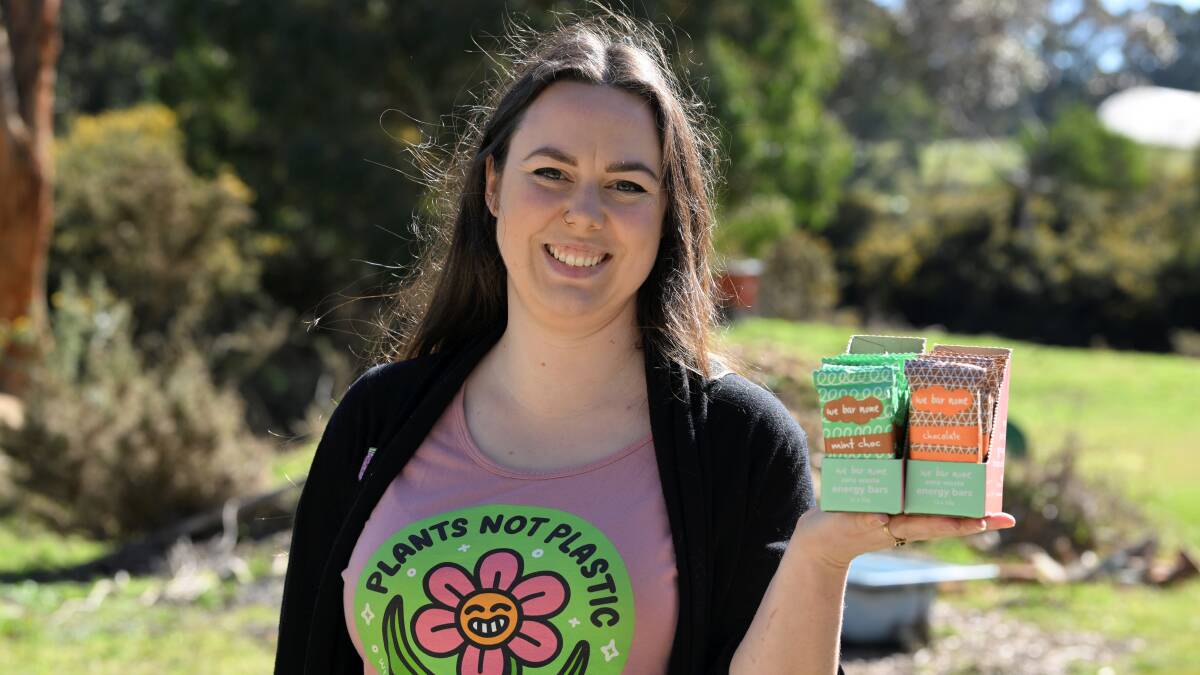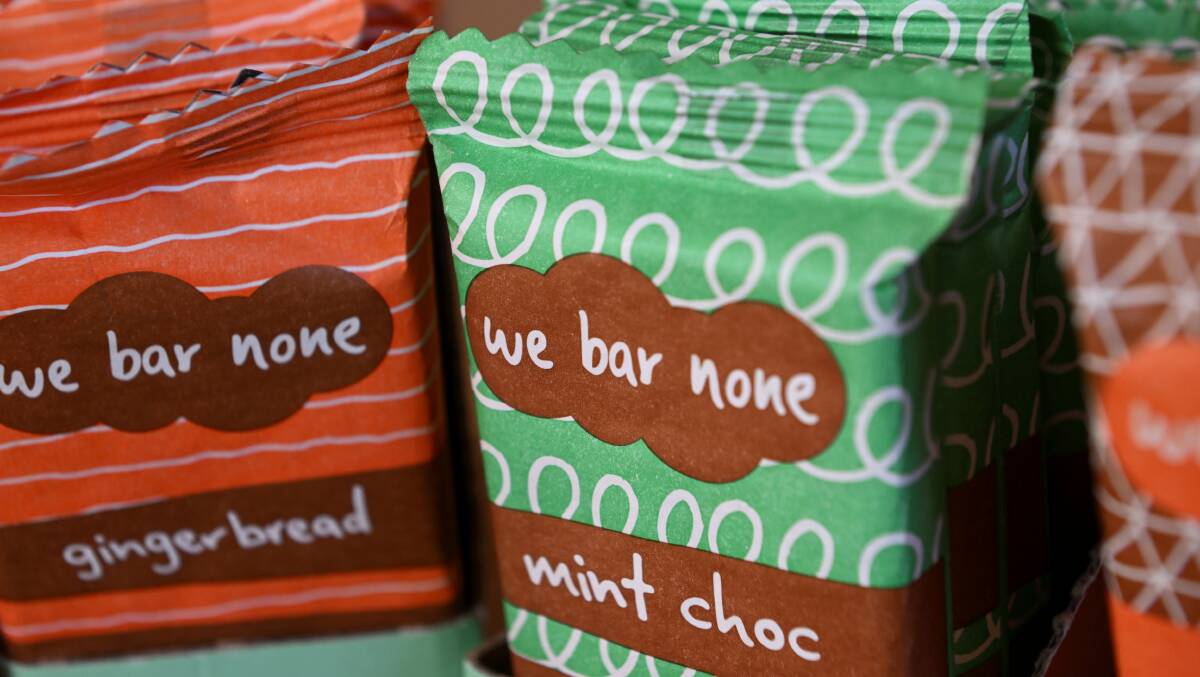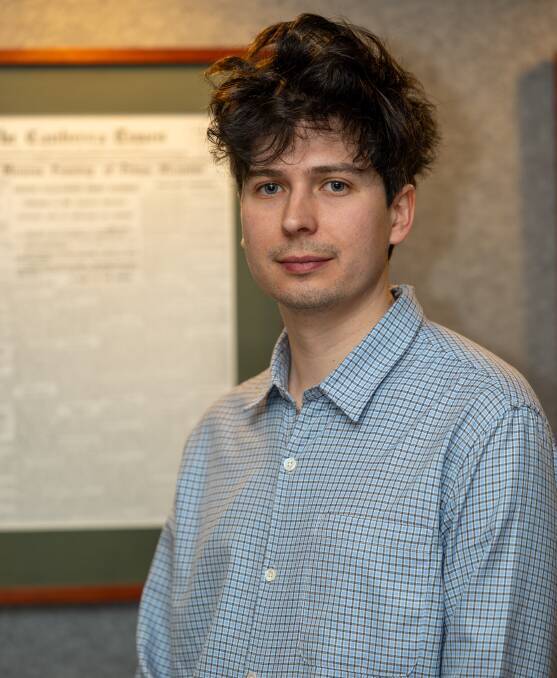For Ellen Burns running a successful business from her home in Ballarat was never enough.
She spent five years establishing her health bar brand We Bar None - then she needed a new challenge.
So, at the age of 28, Ms Burns turned to packaging. She wanted to make her wrappers 100 per cent compostable.
Hers was the first Victorian company to make the environmentally friendly transition, and just the third business in Australia.

Before moving to compostable packaging she experimented with wrapping her bars in baking paper and trialled recyclable plastic pouches.
"It's pretty confronting when there's just a box of plastic literally delivered to your house," she said.
"It's pretty hard to ignore that you're responsible for sending that out into the world."
'We didn't have anything like this in Australia'
Ms Burns came up with the idea for We Bar None, which specialises in gluten free, vegan energy bars, in 2013 while on a working holiday in Canada.
The lack of healthy snack options was a gap in the market she could fill and, when she returned to Australia, she started her business in Melbourne.
"We didn't have anything like this in Australia at the time. Now we have heaps of energy bars and that kind of healthy snack food market is pretty massive now," she said.
"But 10 years ago we literally didn't have any packaged, healthy convenience foods at all."

Ms Burns moved back to her home town of Ballarat in Victoria's Central Highlands in 2015.
Originally, she made all the bars by hand in her mum's kitchen, but in 2018 she secured a local manufacturer in the suburb of Delacombe, which is when she made the transition to compostable packaging.
As more health food options emerged on the market, Ms Burns said her sustainability stance became a unique selling point and she was surprised more businesses hadn't adopted environmentally friendly options.
"I thought there might be other people in Victoria using it by now, but there's still not many ... up until very recently I was the only energy bar business to be zero waste," she said.
Plastic in the water
According to Australia's national science agency, the CSIRO, there is a desperate need to combat the growing mountain of plastic in our waterways.
For every metre of coastline across the globe there's the equivalent of seven grocery bags full of rubbish. And soft plastics, such as food packaging, is the biggest killer of marine life.
Three quarters of the rubbish found on Australian coastlines are plastics, according to the CSIRO.
The Boomerang Alliance, formed in 2003, is an environment group dedicated to reducing Australia's plastic use.
Director Jeff Angel said the next "big item" on the group's agenda was to campaign for regulation of the packaging industry.
He said companies should embrace packaging that's recyclable, has recycled content or reusable to avoid it ending up in waterways or breaking up into microplastics.
"All that plastic is accumulating and will last hundreds of years," he said.
"That's a really terrible pollution legacy our society shouldn't be allowing."
Regional cities embrace local
While We Bar None's sustainable selling point has secured Ms Burns deals with notable organisations such as Zoos Victoria and the University of Melbourne, the fight for recognition has been tough.
She struggled to find Melbourne buyers because she said businesses were sceptical of a young, unproven entrepreneur.
It was only when Ms Burns moved back to Ballarat that she secured steady stockists.
"I actually found it really difficult to start a business in Melbourne. I was going around to shops and stockists and saying I was a small, local business and not really getting the reaction I expected," she said.
"People didn't care as much that you were a local business. There's a bit more competition [in Melbourne]; it probably means less to be a local [there].
"When I moved back to Ballarat in 2015 the reaction was really remarkable, I was going into stockists, and they were really wanting to support me because I was a local business."
My story

Since moving to Ballarat in early 2023, I've seen first hand the difficulties of running a business in a regional area, which are often under-resourced in comparison to the capital cities.
The cost of living crisis is only making it harder.
But as climate change progresses I don't think businesses should be celebrated simply for being profitable.
I think young people want to see organisations operate ethically.
For me Young and Regional: We Mean Business is a good way to celebrate a successful business which has, in its own small way, also taken a stance on a global issue.

